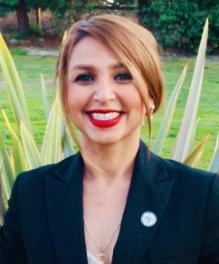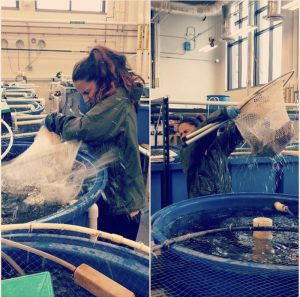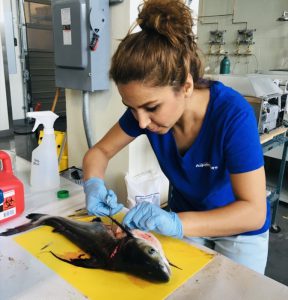 Please welcome to Dr. Razieh Farzad, Assistant Professor of Food Science specializing in aquaculture and seafood science, to our Discover FSHN series! Dr. Farzad joined the Food Science and Human Nutrition department at UF this year and is already making an impact on campus and with the Florida seafood industry. Read on to learn about her path to aquaculture and the FSHN department, her crucial work in food safety with FSHN Extension, and the most important fact the public should know about aquaculture.
Please welcome to Dr. Razieh Farzad, Assistant Professor of Food Science specializing in aquaculture and seafood science, to our Discover FSHN series! Dr. Farzad joined the Food Science and Human Nutrition department at UF this year and is already making an impact on campus and with the Florida seafood industry. Read on to learn about her path to aquaculture and the FSHN department, her crucial work in food safety with FSHN Extension, and the most important fact the public should know about aquaculture.
Tell me about how you became interested in food science, aquaculture research, and the Florida Seafood Industry. When did you first begin studying these areas, and what path did you take to get to UF?
Persian culture is intertwined with food. Being an Iranian, my interest in food science stems from growing up in a country in which its unique history and geography translate to a diverse mix of cultural influences on food. I started studying food science when I was an undergraduate student in Iran. I am very interested in food science and food scientists’ role in ensuring food and nutrient security and transitioning to a sustainable and resilient food system. Aquaculture fascinates me as it is seen as a key to the future of food production, health, and nutritious food systems.
Aquaculture is one of the fastest-growing forms of food production, and more than half the world’s seafood is coming from aquaculture production.
I first started researching the area of aquaculture and seafood science when I was a Ph.D. student at Virginia Tech. After working at the University of California Davis Aquaculture Extension lab as a postdoctoral scholar, I joined the Food Science and Human Nutrition Department at UF as a Seafood Scientist. Florida’s Seafood industry (both fisheries and aquaculture) is unique and fascinating. The sector is an indispensable cornerstone of the state’s economy. In Florida, we harvest fish from the Atlantic and Gulf of Mexico. At the same time, an estimated 1,500 species or varieties of fish, plants, mollusks, crustaceans, and reptiles are being produced by the aquaculture industry. Depending on the time of year, seafood lovers can enjoy everything from alligator and clams to blue crab and yellowfin tuna.
Would you share some of the recent projects you are working on?

My research background is on fish nutrition and exploring the effect of fish feed, or as we call it, “aquafeed,” on the nutrition composition of fish that will be consumed by humans. Here at UF, my research is the natural progression of my previous research at Virginia Tech and UC Davis. I will continue developing aquafeeds that are sustainable and can improve fish production and the nutritional benefit of fillets for human consumption. The focus of my current research is the enrichment of aquafeed with micronutrients. I am working on using the advances in nanotechnology and material science to improve the bioavailability of the micronutrients such as zinc, selenium, and vitamin D for fish.
Also, in collaboration with researchers at the Department of Sociology of the University of Nebraska-Lincoln, I am researching consumer perception of alternative seafood such as plant-based and cell-based seafoods.
Tell me about your involvement with FSHN’s Extension Program. What kind of services do you offer?

I am actively engaged in developing best management practices, including participating in developing and rolling out an aquaculture Hazard Analysis Critical Control Point (HACCP) program for finfish and shellfish aquaculture in Florida. Also, I interact with and provide leadership for Florida Sea Grant (FSG) extension agents who work in coastal communities around the state. My aim is to maintain the productivity and reputation of the established seafood technology program currently shared by the Food Science and Human Nutrition department and FSG.
The COVID-19 pandemic forced many of our extension programming online. Therefore, I am developing a Virtual Seafood Outreach Program to keep engaged and connected with the community and address perceptions and misconceptions about seafood safety, quality, and production in our region. My program will include short courses, in-service training, and workshops related to seafood. I have initiated the program by organizing a monthly Seafood Virtual Office Hour.
What do you believe is the most important fact the general public should know about aquaculture?

Aquaculture is one of the fastest-growing forms of food production, and more than half the world’s seafood is coming from aquaculture production. Yet there are many misconceptions about the quality and nutritional value of farmed-raised or aquacultured seafood. For aquacultured seafood, aquafeed is the most significant contributor to a fish’s nutrient composition, such as Omega-3 content. Many farmers work to match or even exceed the nutrient levels found in wild species by providing high-quality food to the fish. So, farmed raised fish have a comparable nutritional quality to wild-caught seafood.
What do you like to do in your free time?
I dance, cook, and listen to music, books, and podcasts in my free time.
What is your earliest food-related memory?

My earliest food-related memory goes back to the celebration of Persian New Year or Norouz, which begins on the first day of spring. Persian herb rice with fish, which combines some of the most symbolic foods for Norouz into a delicious, fresh, and healthy meal, is connected to my most vivid childhood memories.
Interested in learning more about FSHN’s Food Science programs? Read more here, here, and here!
P.S. The Discover FSHN Series highlights the unique experiences of UF’s Food Science and Human Nutrition students, faculty, staff, and alumni. Want to read more about the amazing work going on in the FSHN department? See our previous features below:
Undergraduate Students:
Shannon Mai, Dietetics
Alex Colon, Dietetics and Jenny Duong, Food Science
Jackie Shannon, Nutritional Sciences
Jennifer Jordan, Food Science
Lily Tucciarone, Dietetics
Graduate Students:
Savanna Curtis, Food Science (M.S.)
Carley Rusch and Matthew Beke, Nutritional Sciences (Ph.D.)
Alexa Hosey, Dietetics (MS/DI)
Vicnie Leandre, Food Science (M.S.)
Rufus Theophilus, Nutritional Sciences (Ph.D.)
Faculty:
Dr. Naim Montazeri, Food Science/Food Virology
Dr. Jeanette Andrade, Dietetics
Dr. Zhiyong Cheng, Nutritional Sciences
Dr. Juan Andrade Laborde, Global Nutrition
Staff:
Sharyn Passeretti, Lab Specialist
Herschel Johnson, Manager of Student Services
Alumni:
Becca Solch, Nutritional Sciences, Postdoctoral Research
P.P.S. Learn more about FSHN’s renowned programs below!
Undergraduate Programs:
Dietetics
Food Science
Nutritional Sciences
Graduate Programs:
M.S. Dietetic Internship Program
M.S. Food Science and Human Nutrition
Ph.D. Food Science
Ph.D. Nutritional Sciences
 4
4
